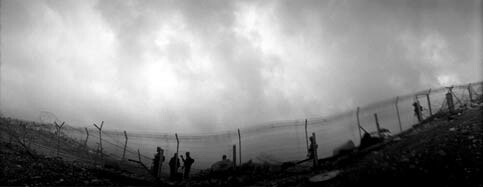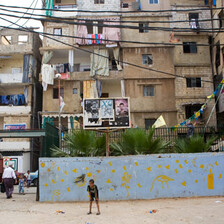Qalandiya checkpoint, Palestine 15 October 2004

Al-Ram checkpoint, also on the same Ramallah-Jerusalem road as Kalandia checkpoint. (Photo: Jamal Wilson)
The difference between Kalandia Checkpoint at the entrance of Ramallah and Hawara Checkpoint at Nablus’s main exit and entry is that there are people who can actually go in and out through Kalandia.
Nablus, like most of the major West Bank cities, has been under intense siege for the last four years. Recently, people over thirty five from Nablus are allowed out sometimes and occasionally students are allowed in and out — once each way each week. Otherwise, if you are from Nablus, you can not leave or enter.
I remember pleading with the soldiers to allow the very pregnant wife of my friend to return to her husband and children in Hawara, the village whose land the checkpoint is built on. She had her marriage certificate with her proving that her husband was from Hawara but her I.D. said Nablus so after standing in the sun for almost two hours she was screamed at to turn back. I told the soldier that I hope his mother will never be treated the way he treated this woman and he answered smugly, “She won’t. She is not Palestinian”.
Ramallah, on the other hand, has special circumstances. After 1967, when Israel unilaterally annexed what they call “East Jerusalem” as part of Israel, they did not want to make citizens of the Palestinians that lived there. So they granted the native inhabitants of Jerusalem the status of “permanent residents of Jerusalem” — a status similar to one a foreigner who was granted permission to live in Israel. They don’t have the right to vote in the national elections and if Jerusalem stops being “the center of their life” — if they move to the neighboring city or go to study abroad — their residency is revoked and they lose their right to live in Jerusalem — or any where else in Israel-Palestine for that matter.
As part of the effort to Judaize Jerusalem (a term used by the Israeli Authorities), Palestinians from East Jerusalem are not given permits to build or even repair their homes in the city. If they built without a permit their houses are demolished. On the other hand they are permitted to build in areas closer to Ramallah like Al-Ram and Samir Amis. These areas are considered by Israel as part of “Greater Jerusalem” so the Jerusalemites that live there pay taxes to the Jerusalem municipality (and receive bullets instead of services). In return — for leaving Jerusalem — they do not lose their residency rights and are allowed through the checkpoints between Jerusalem and Ramallah. The result is that the strangling siege that other cities are subjected to is not complete and Ramallah’s economy has been able to survive.
When my family moved back to Ramallah, I felt like the Jew that was told by his rabbi to take a goat into his over-crowded house after he complained about it being unbearable. A month later when he was allowed to put the goat back in its pen his house didn’t seem that bad. So when my family and I first moved back from Nablus to Ramallah, I almost loved Kalandia checkpoint.
Unfortunately the novelty of being allowed to cross soon wore off and soon I was dreading having to cross Kalandia.
Today I was dreading having to witness the humiliation of people. I was dreading the frightened children, the crying babies, the old and infirm forced to wait while being bossed around by armed men the age of their sons or their grandchildren.
“Stand, wait, walk…” I was dreading having to witness people being threatened or beaten by the Israeli soldiers. I was dreading not being able to intervene physically because my baby daughter Shaden was coming with me. I was dreading the helplessness and the rage that comes with crossing Kalandia checkpoint. But, It was the first training of the olive harvest campaign and I wanted to be there. So I took my daughter Shaden and a very deep breath, and called a cab.
After the soldiers’ usual surprise at seeing an Israeli Jew come walking out of Ramallah and the usual scolding of “It’s illegal for you to be there”, I gave my routine explanation. I told him I was married to a Palestinian and lived in area “C” beyond the checkpoint. An Apartheid military order was issued in October 2000 that stated that Israeli citizens were forbidden to enter area “A”. The allegedly “Palestinian controlled” areas.
After he communicated my details over the wireless I was told to wait. This was not unusual.
I was used to this routine by now, The commander of the checkpoint, a large freckled boy, called me over to him. “Aren’t you afraid to go in there? “he asked. “I don’t need to be afraid. I don’t have a gun.” I explained “I am not there as an occupier so I am not treated as one.” He asked: “Do you see me here with a flag?”
“No. I see you here with a gun,” I replied.
Apparently he didn’t like my answers because then he ordered me: “Don’t stand close to me. Go stand over there and stop disturbing my work”.
After half an hour of waiting to be cleared to proceed I asked what was going on. I was told by a chubby young soldier that I was wanted by the police and that they should be arriving shortly. After another hour in which I tried to intervene, as soldiers used unnecessary violence in two separate incidents, I asked him again if the police could be told to hurry since I had a baby with me, He hinted that it was the Shabak — the Israeli secret service — that wanted me and said that the issue was out of his hands. That worried me.
I have been summoned to interrogation with the secret service around three years ago. The summons had arrived in the mail asking me to report to a certain police station for a clarification. Only after I entered the office was I told by the interrogator that he was from the “Shabak”.
I asked my interrogator if he had ever, while working with Palestinians, applied “moderate physical pressure” — the technical term used for torture by the Israeli authorities. He yelled that that didn’t exist. “Moderate physical pressure” was official procedure in interrogating Palestinians until 1999 after which it became unofficial procedure.
Now, I wondered why they needed me to wait at the checkpoint. Will they take me now? What about Shaden? I didn’t have enough diapers or warm clothes for her for a long stay out. What about my eldest daughter Nawal who is a year and seven months old now and would be home from day care soon? My fears were fueled by the fact that Tali Fahima, an Israeli woman who had spent time building bridges in Jenin refugee camp, had been recently accused by the Shabak of aiding terrorism. They held her for thirty days which is as long as the law permits to hold an Israeli without filing charges, and interrogated her fifteen hours a day.
When the legal time they could hold her was up the Shabak had nothing to charge her with. So she was sentenced for a renewable sentence of four months of administrative detention. The criminalization of Israeli peace activists is not surprising, actually it is inevitable. No society can indefinitely uphold a set of double standards. Treating Palestinians as subhumans who aren’t entitled to basic rights while maintaining a democracy for Jews is not sustainable or even possible.
After two hours Shaden was getting cold and beginning to sneeze, I considered leaving my I.D. with the soldiers and just walking away. Would they chase me?
After three hours of being forced to witness the hell of Kalandia, a police car from the neighboring settlement of Neve Yaakov appeared with a summons like the one I had received in the mail three years ago. I was being asked to come in for “a clarification” on the nineteenth Of October.
“Couldn’t you have sent this to me the mail?” I asked the policeman that gave me the summons. I was close to tears by this time.
“They wanted you to get it by hand” He said.
“And it took you three hours to get here?”
“You can file a complaint.” he answered. The freckled checkpoint commander reappeared. He called me “cheeky” for complaining and again repeated what seemed to be a favorite of his. He came up close to me and ordered “Don’t stand so close to me. You’re disturbing my work.”
I guess he was right. In a land where women give birth at the side of the road and patients die “waiting” by these checkpoints while thousands — whose only crime is to fight for their freedom — are spending there lives in prison camps, it is cheeky to complain about three hours.
Neta Golan is an Israeli peace activist.




